WaterDrive
Are you drinking enough water?
Where do we start with such a subject? There has been a lot of research on water and drinking thereof – reports, surveys, testing etc. Leading institutions, universities and academics from all over the world have had their say. It is all about 2 areas really: how much should you drink, and what sort of water - tap water, bottled water, filtered water. That’s it.
There are also the questions about whether soft drinks, teas and coffees apply as well as water. We don’t aim to solve the problem. Merely give a balanced view on the whole aspect of hydration.
Click on a heading below and see a summary, and if you're interested you can GO and read more about it!
Here are some initial thoughts about water. GO!
Here are some facts and stats about water. GO!
It’s said you are what you eat – is it also true that you are what you drink? GO!
The body is about 60% water – how much should you drink each day? GO!
Drinking enough water affects our health in many ways, especially as we get older. GO!
How are water companies managed, and how well are they doing? GO!
There are potentially dangerous chemicals in our drinking water which aren’t being tested for. GO!
See the environmental performance report from 2020 GO!
See whether flavoured water is good for us or not. GO!
See the pros and cons of drinking these, and also see what YouDriveHealth thinks. GO!
If you’re a visitor to our site you can join and download information, assess your own health and create your own action plans, and even contribute to our site. GO!
See what you can do next. GO!
We have some additional information and stuff on this subject. GO!
Some Initial Thoughts About Water
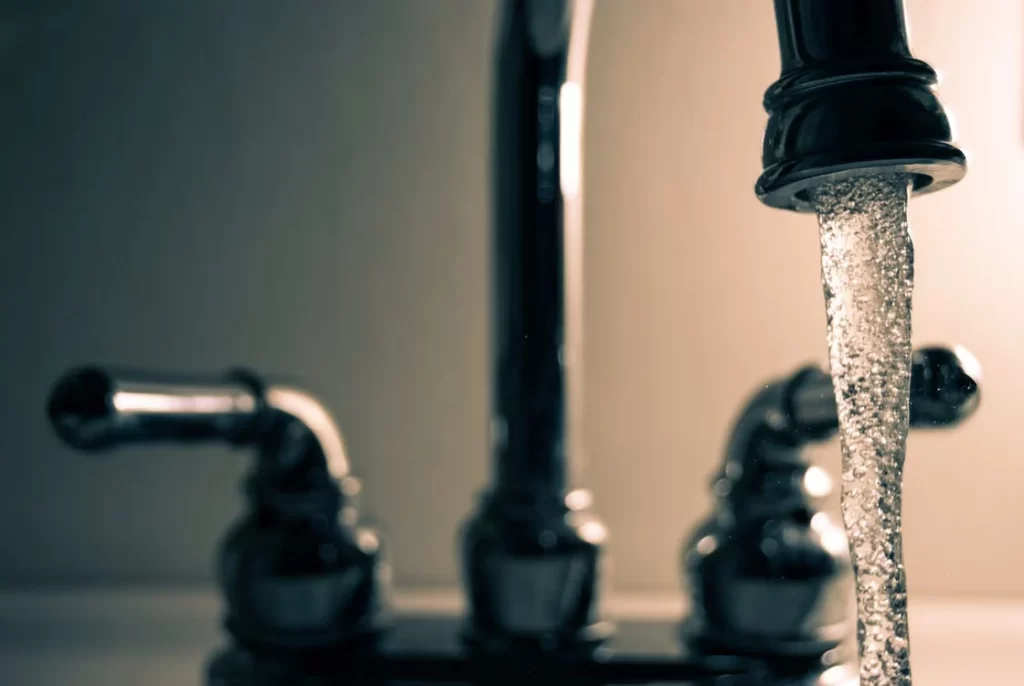
Quality of water
For sure in the UK, we are lucky that tap water is drinkable and in most parts of the country tastes ok. But its down to individual taste and location. Some parts of the UK the water is processed to the ends of the earth and back, whilst other places the water travels through limestone and gives a very funny taste.
It also does appear to be down to the specific water company. Some are far more diligent than others and take providing excellent drinking water to your homes a very important task, whilst others focus more on the process than the consumer. How many times have turned the tap on and got what appears to be a glassful of milk because they dumped too much chlorine in the mix?
Facts About Water
7.7 BILLION single use plastic water bottles are used in UK every year (Guardian)
£2.4 BILLION is what the UK bottled water industry is worth per year (BritishBottledWater.org)
400 YEARS is how long it takes a single use water bottle to decompose (Forbes)
391 BILLION LITRES was the global consumption of bottled water in 2017 (Statista.com)
of the UK population used bottled water in 2017 (Mintel Bottled Water report)
of UK population drank bottled water every day in 2018 (Mintel Bottled water Report)
of botteld water brands contained micro plastic contamination (Ord Media)
of people in the UK drink tap water
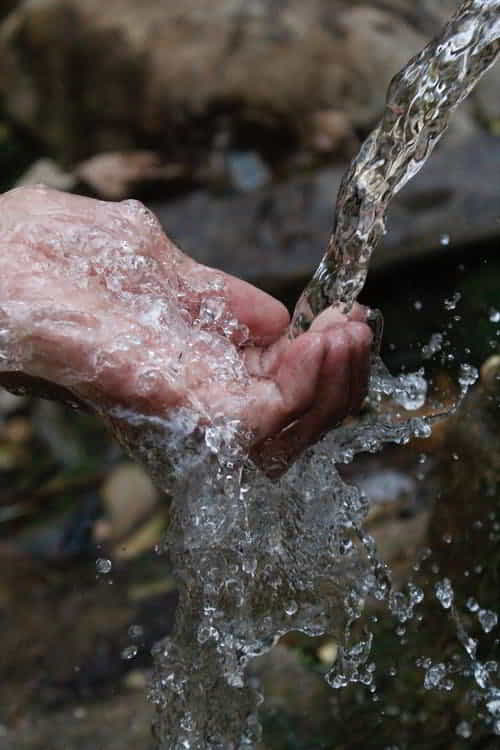
“You are what you eat” - you are also what you drink
Scientists warn that fluid deficits of more than 1% decrease exercise performance, thermoregulation, and appetite, and blunt baroreceptor control. With fluid losses of 4% and more severe performance drops are observed as well as difficulties in concentration, headaches, irritability and sleepiness, cardiovascular function impairment, increases in body temperature, in respiratory rates, and in heart rate. Researchers add that the effects are more pronounced when heat stress is added.
Dehydration of more than 10% at high ambient temperatures is a serious risk for a life-threatening heat stroke with elevated body temperature, inadequate cardiac output leading to reduced perfusion of tissues and eventually to rhabdomyolysis and organ failure.
For sure Hydration is vital for life. Drinking a glass of nice cold water to start the day, drinking a glass up to 45 minutes before a meal fills the stomach and gets the juices flowing and fills you up, which could help with weight loss and food portion size [see FoodDrive] and having a glass at the side of our bed on a night all seem sensible things to do.
Well as the saying goes “you are what you eat”. I guess we should extend that to also you are what you drink. Hydration is one of the most important aspects of physical and mental health keeping your body hydrated. Check out this fantastic company who specialise in water products.
See Water for Health website or have a look at the video by the founder
see video by Water for Health founder.
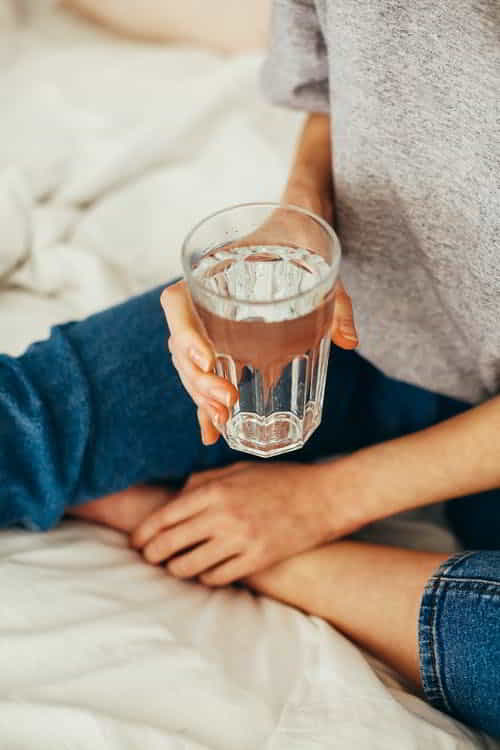
The body is about 60% water, give or take.
You are constantly losing water from your body, primarily via urine and sweat. To prevent dehydration, you need to drink adequate amounts of water.
There are many different opinions on how much water you should be drinking every day. Health authorities commonly recommend eight 8-ounce glasses, which equals about 2 liters, or half a gallon. This is called the 8×8 rule and is very easy to remember. However, some health gurus believe that you need to sip on water constantly throughout the day, even when you’re not thirsty.
As with most things, this depends on the individual. Many factors (both internal and external) ultimately affect your need for water. This article takes a look at some water intake studies to separate fact from fiction and explains how to easily match water intake to your individual needs.
Should we include soft drinks and hot drinks in with that total?
Plain water is not the only drink that contributes to your fluid balance. Other drinks and foods can have a significant effect.
One myth is that caffeinated drinks, such as coffee or tea, don’t help you hydrate because caffeine is a diuretic.In fact, studies show that the diuretic effect of these beverages is very weak.
Most foods are also loaded with water. Meat, fish, eggs and especially fruits and vegetables all contain significant amounts of water.
See Healthline's article on 19 water-rich foods

How does hydration impact our health
Drinking enough water each day is crucial for many reasons: to regulate body temperature, keep joints lubricated, prevent infections, deliver nutrients to cells, and keep organs functioning properly. Being well-hydrated also improves sleep quality, cognition, and mood.
Here are the reasons why you need to drink water throughout the day:
Support vital functions in the body.
Muscle stamina. Kidney function. Ease digestion. Promote circulation. Aid weight Management Soothe joints. Helps Clear skin. Boost brain function.
Carrying nutrients and oxygen to your cells. Flushing bacteria from your bladder. Helps prevent constipation. Normalizing blood pressure. Stabilizing the heartbeat. Protecting organs and tissues.
It forms saliva and mucus. It cushions the brain, spinal cord, and other sensitive tissues. It regulates body temperature. Supports detoxification of the body. Transportation of nutrients around the body.
In older people it is vital to remain hydrated as this can bring on or accelerate Increased confusion and/or a change in usual behaviour are the first signs that someone with dementia may be dehydrated. Additional behaviour changes associated with inadequate fluid intake include weakness, fatigue, agitation, muscle cramping in the arms and legs, nausea and dizziness.
So, clearly hydration for all people is vitally important be it tap or bottled.

Are all water companies and industry being good environment citizens?
It is clear that not all water companies are the same not only in service but in breaches of water health standards. Also, not only water health but failing to ensure our rivers are kept clean.
In the UK the Environment Agency [ EA] is responsible for managing the industry along with The Water Services Regulation Authority (Ofwat) But it should be stated that the EA does not test river water for faecal bacteria.
Let’s look at the facts:
- In 2020 there were 160 breaches of Environment Agency permits to release sewage into rivers, UCL professor tells MPs
- Pollution in the Ouseburn, a city centre stream, Jesmond Dene, Jesmond, Newcastle upon Tyne, England.
- The scale of water companies illegally discharging sewage is 10 times greater than the Environment Agency (EA) estimates, MPs have been told.
- Peter Hammond, former professor of computational biology at University College London, now retired, said his analysis of sewage treatment works found in 2020 alone 160 breaches of permits granted by the watchdog to allow sewage discharges.
- The EA has only prosecuted 174 cases of illegal discharges in the last 10 years, he said on Wednesday.
- The MPs were also told that Mogden sewage treatment works, one of the biggest in the UK, discharged the equivalent of 400 Olympic swimming pools’ capacity of raw effluent into the river Thames over two days last autumn.
- Five years ago, half a billion litres were released. That is steadily increasing. Last year it was 3.5bn litres. On two days in October last year, they spilled 1bn litres. That is the equivalent of 400 Olympic swimming pools of sewage each day.
This press release from the Governments own website states; The Environment Agency (EA) and Ofwat have launched a major investigation into sewage treatment works, after new checks led to water companies admitting that they could be releasing unpermitted sewage discharges into rivers and watercourses.
This investigation will involve more than 2000 sewage treatment works, with any company caught breaching their legal permits facing enforcement action, including fines or prosecutions. Fines can be up to 10% of annual turnover for civil cases, or unlimited in criminal proceedings.
Poor water quality in English rivers is a result of chronic underinvestment and multiple failures in monitoring, governance and enforcement, the Environmental Audit Committee warns. Only 14% of English rivers meet good ecological status, with pollution from agriculture, sewage, roads and single-use plastics contributing to a dangerous ‘chemical cocktail’ coursing through our waterways. Not a single river in England has received a clean bill of health for chemical contamination.
Drinks firm Heineken UK, food producer Filippo Berio and utility company Anglian Water Services are among six businesses that have agreed to six-figure charity payments after breaching environmental laws.
The Environment Agency (EA) has enforced the payments, after the companies broke laws relating to river pollution, permit conditions and recycling.
The firms – which also include German healthcare company Sandoz, water provider Northumbrian Water and food manufacturer Kerry Ingredients – agreed to make payments ranging from £120,000 (from Sandoz) to £375,000 (from Northumbrian Water), depending on the severity of the breach.
In total, 26 companies were found to have breached environmental laws, and collectively agreed to raise £1.5m
Potentially deadly bacteria could be present in the tap water of hundreds of postcodes in Surrey and Kent, officials have said, leading to concerns that thousands of homes could be contaminated.
Cambridge Water has admitted that homes in South Cambridgeshire were supplied with contaminated water containing a toxic chemical known as perfluorooctane sulphonate (PFOS).
Water was found to contain four times the regulatory limit of PFOS. Whilst the supply of such contaminated water was halted in June 2021, Cambridge Water failed to notify 1,080 residents.
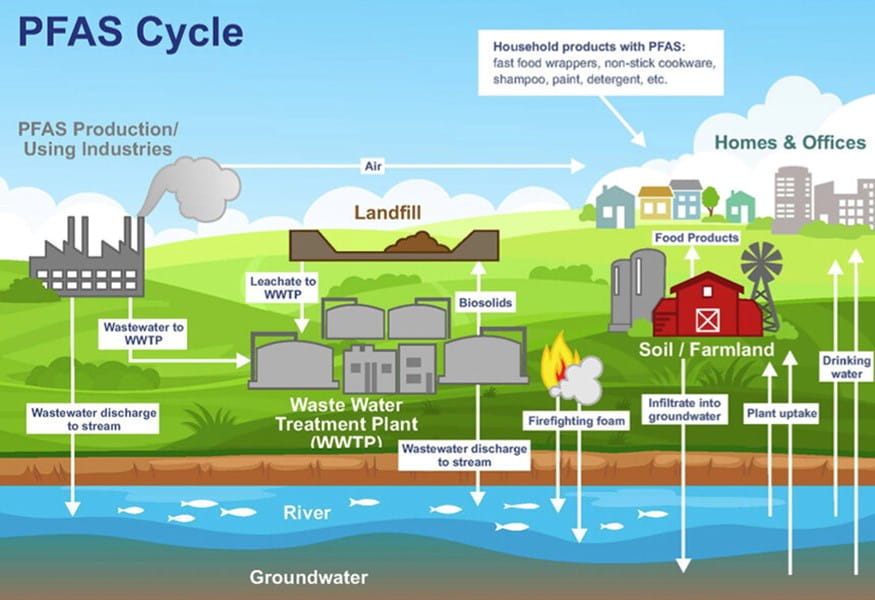
Forever Chemicals [ PFAs] toxic chemicals in our drinking water
PFOS belongs to the perfluoroalkyl and polyfluoroalkyl substance (PFAS) family, a group of manmade chemicals known as ”forever chemicals” due to their inability to break down in nature. It is reported that forever chemicals are “now found within the blood of virtually every person on the planet, including those of unborn foetus”.
Government is not testing drinking water for PFAS, which studies have linked to numerous health issues. Water companies do not routinely test for PFAS either.
The Environment Agency stated that PFAS are” extremely persistent, toxic and bioaccumulate through the food chain”. They are considered a global pollutant and are known to cause a multitude of health issues. PFOS (a type of PFA) have been linked to altered thyroid hormone levels in adults, elevated cholesterol, attention deficit hyperactivity disorder in children, chronic kidney disease and impaired fertility.
Water and Sewage Companies Report
The graph speaks for itself
The number of serious water quality pollution incidents from water company sewerage assets continued to be unacceptable. In 2019 there were 48 serious pollution incidents, the same number as in 2018. More than half of the incidents were from the assets of 2 companies (Anglian Water - 12 and Thames Water - 15) 2 companies (Anglian Water and Southern Water) were both significantly below target (red) for this EPA metric. Only 3 companies (Severn Trent, United Utilities and Wessex Water) achieved performance better than targeted (green) for this EPA metric
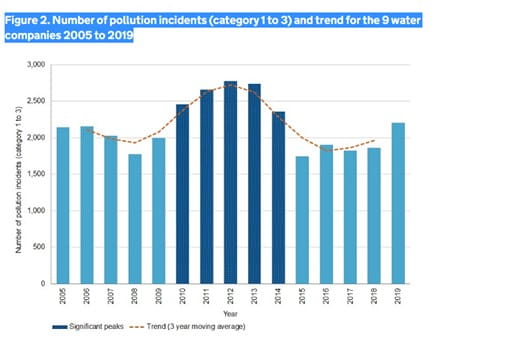
Total pollution incidents
The total number of water pollution incidents from sewerage and clean water assets increased compared to 2018 (Figure 2). Our performance expectation for 2020 is for water companies to achieve at least a third reduction in pollution incidents compared to 2012. We are disappointed that the sector almost achieved this in 2018 but with the increase in pollution incidents in 2019 has now moved further away from the target (only 21% reduction from 2012). In 2019.
There were 2,204, an increase from 1,863 in 2018 and 1,827 in 2017, and the highest number since 2014 numbers for Southern Water more than doubled (458) compared to 2018 (188), contributing the majority of the increase across the sector in 2019
only 2 companies reduced pollution incidents compared to the year before (Severn Trent Water and Yorkshire Water).
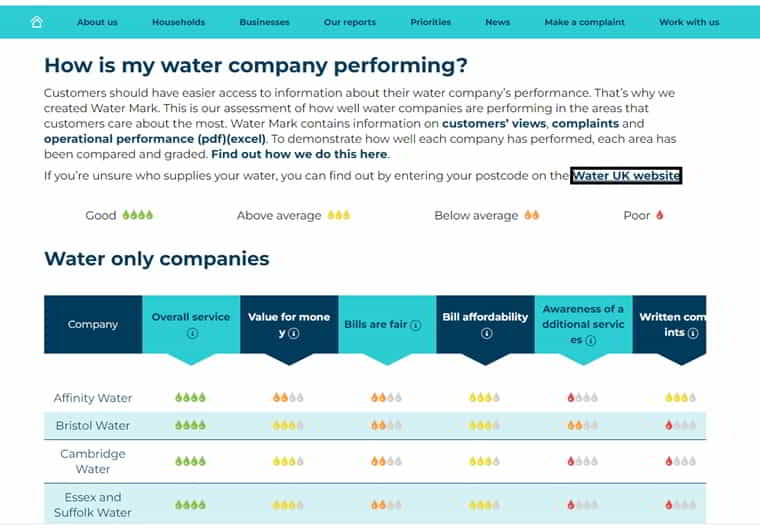
Who supplies my water and how do they perform?
You can find out how your local water supplier is performing by looking on WaterUK website. This has a lot of information on water, including technical information and information on the net zero water initiative, aiming for water companies to reach net zero on operational emissions by 2030.
You can find which water company supplies your water by clicking the link and entering your postcode. Then to see how that company is performing, click on 'Information for Customers' then scroll down and select Water Company Performance. This has a load of information about water, and when you select a measure you can see the overall position as a score, and in most cases you can click again to see how the water companies are performing.See the WaterUK website to find your water company and see how they are performing
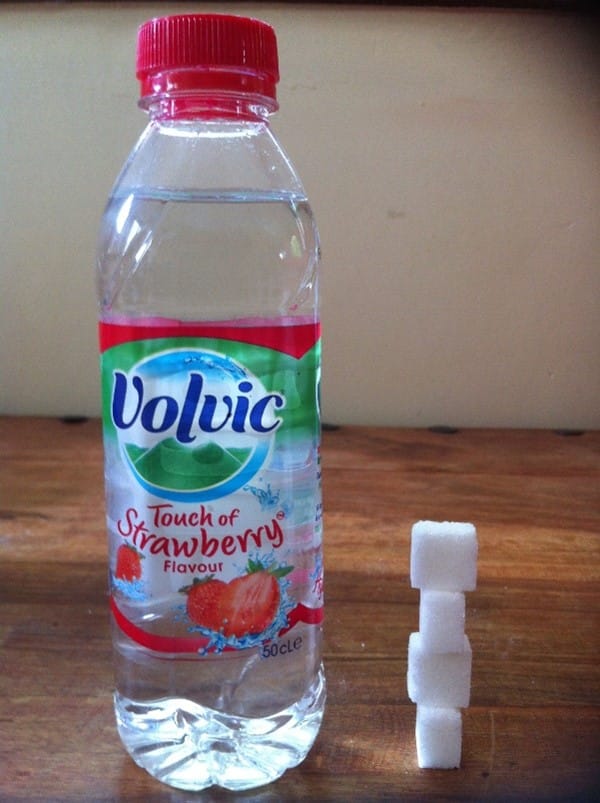
Are flavoured waters any good for us?
In short, not really. The question you always have to ask yourself with anything that is flavoured is; is it real flavour or artificial, simple as that. If it is mineral or spring water and the flavouring is a natural juice added without additives or sugar then fine but the vast majority are not.
The reality is that these drinks are not good every-day choices at lunch time or to drink before, during and after sports. Some flavoured waters will contain added sugar and others contain intense sweeteners and additives. Many contain fruit 'flavouring' as opposed to any real fruit.
Again, why waste your money on flavoured water. Take the slow water from the tap , filter into a jug. Place in fridge. Take the zest of a small piece of lemon/orange/pineapple zest put it in a glass and pour filtered water over it and leave it in the fridge. Next day drain and pour into stainless steel water bottle cost nothing.
Again, Why waste your money on flavoured water. Take the slow water from the tap , filter into a jug. Place in fridge. Take the zest of a small piece of lemon/orange/pineapple zest put it in a glass and pour filtered water over it and leave it in the fridge. Next day drain and pour into stainless steel water bottle - this costs nothing.
It's better to drink bottled tap water for health reasons
The box below shows some information on bottled water. Hover over it and it will switch to show you information on tap water. Click the button on the back to see more information and YouDrive’s view!
Drink bottled water
Drink tap water
For visitors
Why don't you join us?
You can register to join us as a member, when you’ll be able to download our stuff and comment, or as a YouDriver when you’ll also be able to check your health and set up your own action plans to make some improvements. If you’ve already registered, sign in below. Or let us know what you think.
Water - The Source of Life
Researchers at ETH Zurich seek answers to fundamental water-related questions: What is the source of water on earth; the risks associated with earthquakes in alpine glaciers; and how can we assure clean water supplies in megacities and developing countries?


Next Steps
It doesn’t matter what stage you’re at – it’s important to be the best you can be. At the end of the day it’s about taking personal responsibility – You Drive!
It’s really your choice. You can find out more information about the subject, or see other institutions that can help by going to Support. There you will find organisations, training, coaching, self-help courses and other items to support your personal change. We have also started developing a panel of experts to provide info, advice, help and support.
Get Support
There are times when you need some help to meet your aims – a helping hand. That might be an organisation that can provide you with some help, some specialised information, a particular book or tool to help, or just getting some background reading material.
We have a lot of items which appear on our Drives and other pages, which you can go to by clicking on the picture or link. Some contain affiliate links and we may receive a tiny commission for purchases made through these links.
If you know of anything which could help you or our other visitors then please click the button on the right, which will take you to a Contacts page where you contact us.
Experts
We are compiling a list of experts who can provide advice, help or specialised services. You will be able to access these experts from anywhere on our site you see our ‘Experts’ symbol. Click the green E to see what our Experts list will look like, with a couple of imaginary ‘experts’ added!
More Information
Scroll down to see more information on this Drive.
If you register you can also download reports, white papers, quizzes and other collaterals. We will never ask you for any financial information, and we’ll only send you the information you want. You can register for our site either above or in the footer below. You can provide your own questions and experiences in order to help other members. We only moderate for spam and inflammatory language – see our moderation policy.
If you’ve found this interesting, then please share it on social media. Choose your network!
More information
Water: For Health, for Healing, for Life
You’re Not Sick, You’re Thirsty!
Asthma, allergies, arthritis, hypertension, depression, head-aches, diabetes, obesity, and MS. These are just some of the conditions and diseases that are caused by persistent dehydration.
Fruit Infused Water
50+ Original Fruit and Herb Infused SPA Water Recipes for Holistic Wellness
Super Healthy, Revitalizing, and All-Natural Fruit Water Recipes to Boost Your Wellbeing!
Water Codes
The Science of Health, Consciousness, and Enlightenment
The most revolutionary work to date on the subject of Water, Consciousness, and Spirituality. Through new science and ancient wisdom, Water Codes reveals the truth about Water and Consciousness, and decodes the leading sciences of health, DNA, energy, and enlightenment.
7 Cup Water Filter Jug With Advanced 5 Stage Filter
Water Quality Meter + Water Filter Cartridge Included, 1.7 litres
Available in 1.7 litres, 2.4 litres, 2.6 litres or 2.8 litres with or without filters.
SodaStream Crystal Sparkling Water Maker Machine
with 600 ml Reusable Glass Carafe for Carbonating and 60 L CO2 Gas Cylinder – Crystal Machine Only Compatible with Glass Carafe Bottle – Black
Instant carbonated water at home: Simply fill with tap water, sparkle and sip. Enjoy your favourite fizzy water any time
There are apps to help you drink enough water – see the Healthline assessment of the top 5
Healthline also have a lot of information on how much water you should drink each day
Tap water drinkers can also see information at Join the Pipe
You can download the Water For Life White Paper from the Government here
















